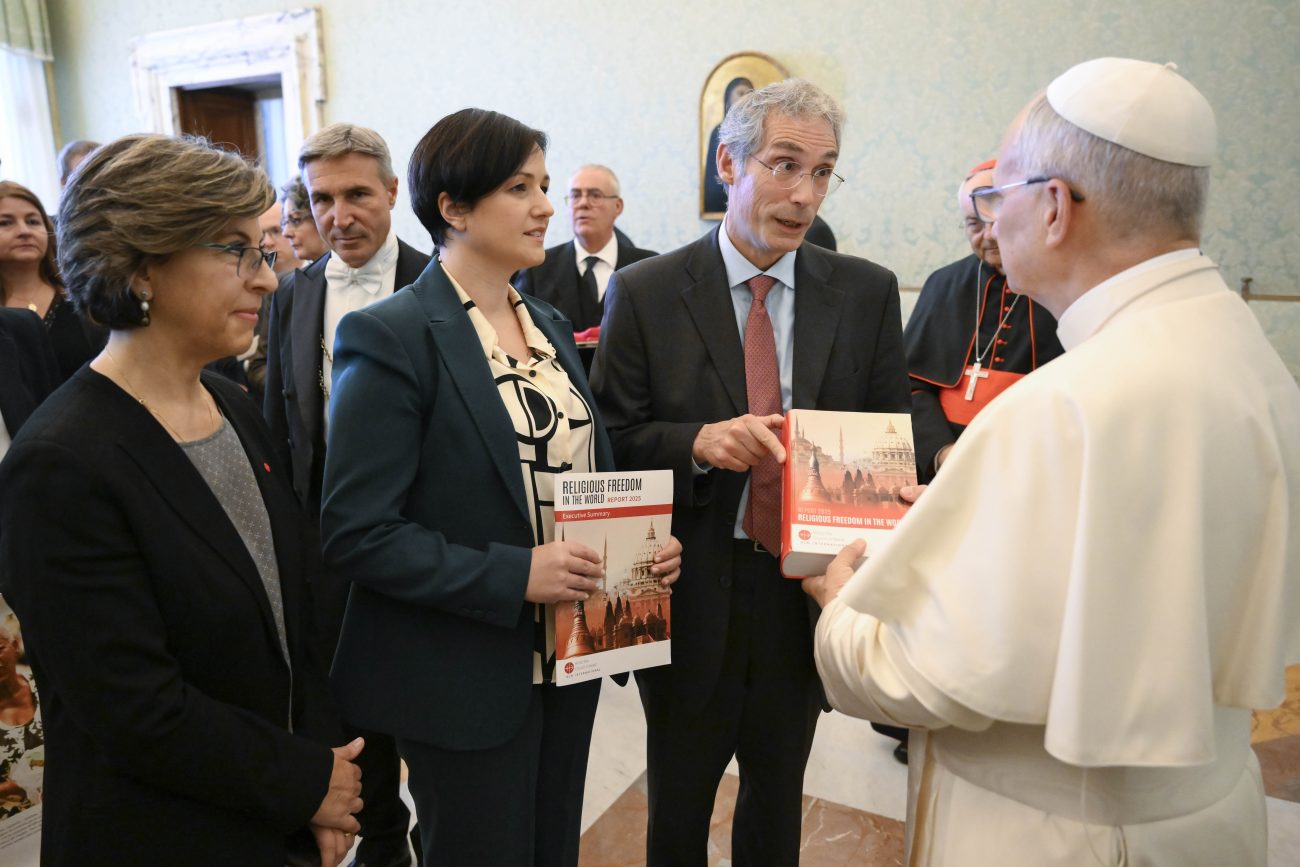ROME (CNS) — Religious freedom is not only a fundamental and essential human right, “it is also a pathway to truth and deeper communion with God and neighbor,” said Cardinal Pietro Parolin, Vatican secretary of state.
However, religious freedom is severely restricted in 62 of the world’s 196 countries, affecting around 5.4 billion people; “in other words, almost two-thirds of the world’s population lives in countries where serious violations of religious freedom take place,” the cardinal said.
Cardinal Parolin was citing information contained in the 2025 Religious Freedom Report compiled by the papal foundation Aid to the Church in Need and released Oct. 21 during a conference at Rome’s Augustinianum Patristic Institute.
The fact that the 2025 report runs 1,248 pages, the largest in its 25-year history, “indicates that violations of religious freedom are increasing year on year,” the cardinal said.
The report, covering the period of Jan. 1, 2023, to Dec. 31, 2024, found that “grave and systemic violations, including violence, arrest and repression, affect more than 4.1 billion people in nations such as China, India, Nigeria and North Korea.”
Speaking to reporters after the event, Cardinal Parolin cautioned against considering all attacks on Christians in Nigeria as signs of religious persecution.
Citing local church sources, the cardinal said much of the violence in Nigeria “is not a religious conflict, it is more of a social conflict, for example between herders and farmers.”
And where Muslim extremists are attacking Christians, he said, they also attack Muslims who disagree with them. “These are extremist groups that make no distinctions in pursuing their goals. They use violence against anyone they consider an opponent.”
Aid to the Church in Need listed another 38 countries — including Egypt, Ethiopia, Mexico, Turkey and Vietnam — as nations where “religious discrimination” is common. The foundation said that in those countries “religious groups face systematic restrictions on worship, expression and legal equality. While not subject to violent repression, discrimination often results in marginalization and legal inequality.”
In Mexico, as well as in Haiti, the report said, “organized crime is a key driver of persecution or discrimination” with priests and other church workers being kidnapped or murdered and house of worship and sacred objects being desecrated in “an atmosphere of blatant impunity” as the government fails to stop the drug cartels and criminal gangs.
Speaking at the presentation of the report, Cardinal Parolin focused on the Catholic Church’s support for the religious freedom of all people, no matter their faith, and on the upcoming 60th anniversary of the Second Vatican Council’s Declaration on Religious Freedom.
The council’s support for religious liberty was “a call to action based on the council’s belief that God himself has made known to mankind the way in which men are to serve him and thus be saved in Christ,” the cardinal said.
And while all people have a “moral obligation” to seek the truth, Cardinal Parolin said, no one can be compelled to do so.
“One must and can only respond in one way: freely, that is to say, out of love, with love, not by force, because Christianity is love,” the cardinal said.
On a personal level, he said, religious freedom “protects the inner sanctuary of the conscience, the God-given compass that guides ethical and spiritual choices.”
And, he said, on a collective level “it fosters vibrant communities where people of different faiths can live together, contribute to society and engage in constructive dialogue without fear of persecution.”
The 2025 Religious Freedom report found that “religious nationalism is on the increase, fueling exclusion and repression of minorities. National identity is increasingly shaped by ethno-religious nationalism, eroding minority rights.”
“In India and Myanmar,” for example, it said, religious nationalism “drives persecution; in Palestine, Israel, Sri Lanka and Nepal, it fuels discrimination.”
The report also found that “religious persecution increasingly fuels forced migration and displacement,” with victims around the world fleeing “violence, discrimination and the absence of state protection.”
Aid to the Church in Need credited the Vatican’s 2018 provisional agreement with China’s communist government for “signs of improvement” for the country’s Christians but noted that improvement applied only to Christians belonging to government-recognized Christian organizations.
Catholic priests and bishops continued to be arrested or detained for not joining the Catholic Patriotic Association, and in many parts of China anyone under the age of 18 is prevented from attending church or a church-sponsored event, the report said.
With the arrest and exile of bishops and priests, the confiscation of church property and the banning of religious processions and other public celebrations, the situation in Nicaragua also is highlighted in the book.
“During the period under review, hostility toward churches intensified, severely violating the fundamental right to religious freedom,” it said.
Aid to the Church in Need also called attention in the report: to “a sharp rise in antisemitic and anti-Muslim hate crimes,” including in Europe and North America; arson attacks on churches in Canada; and vandalism or desecration of churches in the United States.
PREVIOUS: Pope Leo Meets with Coalition of Survivors of Clergy Abuse
NEXT: The Risen Christ Brings Joy, Hope Along Life’s Journey, Pope Says



Share this story